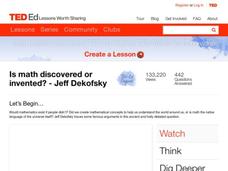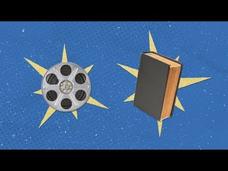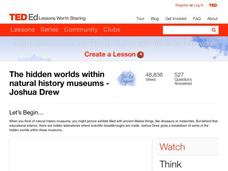Code.org
How Computers Work: Binary and Data
There are two types of people in the world: those who understand binary and those who do not. Pupils watch a video that describes how computers store information using binary code. They learn how programmers can encode text, images, and...
Code.org
The Internet: Packets, Routing and Reliability
Viewers of this video learn about how computers send and receive information through the Internet. It describes how the Internet splits information into packets and sends it over different routes.
TED-Ed
The Artists | Think Like A Coder, Ep 5
Create a diversion! Continuing the quest to save the world, the hero of the series needs to find an artifact inside a tower. To distract the guards, she programs a robot to vandalize some artwork. Viewers learn how to apply loops and...
TED-Ed
How to Understand Power
Where does power come from, and why does it matter? This video will spark engaged thought and conversation amongst your class as it discusses the origins of power, how it's exercised, and what young learners can do to become powerful in...
TED-Ed
Is Math Discovered or Invented?
Did mankind invent mathematical concepts, or is math the native language of the universe itself? Discover the beliefs of famous philosophers such as Plato and Euclid with regard to the place of numbers in nature, and take a brief look at...
TED-Ed
Is It Bad to Hold Your Pee?
How many times should a person pee a day? Is it a bad habit to hold it? What makes us have to go pee? These questions are answered in an informative video about the urinary system, and the importance of urinating at the first sign of...
MinutePhysics
Should You Walk or Run When It's Cold?
Should you stay or should you go? A video lesson examines the heat gain and loss in a cold environment. The narrator compares standing still and running and their effects on heat energy.
Cisco
Episode 1.7: Birth of a Social Enterprise
All's well that ends well! The final episode in a seven-part series shows the outcome of the Global Problem Solver's quest to fix Malawi's aging water wells. The team sees the impact of their efforts firsthand and receives recognition...
PBS
When the Book is Better than the Movie
Sometimes the book is better than the movie; other times, the movie comes out on top. A video discusses the topic of novels and their film adaptations, pointing out specific texts and how the tale translated to the big screen. The...
TED-Ed
Why Should You Read "One Hundred Years of Solitude"?
How does One Hundred Years of Solitude by Gabriel García Márquez represent the genre of magical realism? Scholars explore the topic by watching an informative video. Next, they answer quiz questions and join an online discussion about...
Geography Now
Geography Now! Argentina
Argentina may be named after the Latin word for silver, but there is precious little of the metal there. A video profile describes its otherwise rich history—and mineral deposits— through glib commentary and helpful maps. Learners...
TED-Ed
The Prison Break | Think Like A Coder, Ep 1
Break free from monotonous lessons. An engaging video introduces the computer coding series and describes the ongoing context. Robots have taken over, and the hero needs to escape from prison and save the world by solving a set of clues....
TED-Ed
How Close Are We to Uploading Our Minds?
What would it take to digitally upload someone's mind? A fascinating video first describes how a brain works, then looks at a future where people can live forever through avatars. The video describes the required technological advances...
TED-Ed
The Train Heist | Think Like A Coder, Ep 4
Robots come in handy when planning a train heist. The hero and her robot continue their quest to find artifacts to save the world. They must locate and steal the Node of Power on a specific car of a train by writing computer code for the...
TED-Ed
How Polarity Makes Water Behave Strangely
Water is common? Not really! Learn how the polarity of the water molecule gives it tremendous properties that make is quite unique in the universe. Learners will understand surface tension, adhesion, and cohesion, as well as why these...
Howard Hughes Medical Institute
The Origin of Species: The Making of a Theory
The heartbreaking story of Alfred Wallace's loss of collected evidence opens this documentary about the development of the theory of evolution. You will find supportive resources to use with the movie in your biology class.
ouLearn
The Principle of Comparative Advantage
In the fourth episode of 60-second video clips on economics, you will review the principle of comparative advantage with your learners, explaining the benefits of international free trade as countries specialize and export their...
TED-Ed
Ideasthesia: How Do Ideas Feel?
When our senses provide data to the brain, does the brain translate those senses simultaneously or only after they are transmitted? Ponder this interesting inquiry with another fantastic TED video, and consider whether our cross-sensory...
TED-Ed
The Hidden Worlds within Natural History Museums
Behind the closed doors of natural history museums lies a hidden world of scientific research and discovery that goes unseen for visitors. Follow along as this short video explores different scientific mysteries that have been solved...
TED-Ed
Einstein's Miracle Year
Why was Albert Einstein initially labeled as a "failed" academic, and what events occurred in 1905 that constituted a major turning point for this great scientist? Review Einstein's major theories regarding relativity, light particles,...
Crash Course Kids
Here Comes the Sun
Get to know Sol with this fast paced, kid-friendly video featuring the closest star to Earth, the sun. Super scientists take part in a quick pop quiz, then learn all about Sol's size, distance, and how it creates and sends energy to Earth.
Ereading Worksheets
Pronoun Case and Perspective | Parts of Speech App
Get to know subject, object, and reflexive pronouns with an informative and appealing video that offers insight and guidance into writing grammatically correct sentences. Individuals are provided with the opportunity to check for...
Ereading Worksheets
Comparative and Superlative Adjectives | Parts of Speech App
Get to know what, and how to write comparative and superlative adjectives with an engaging and highly informative video. Descriptions, examples, and rules are explained in detail and followed by an interactive pop quiz and review.
Ereading Worksheets
Adjectives | Parts of Speech App
Give grammar instruction a boost with a video that focuses on adjectives. First, find out what adjectives are and view multiple detailed examples. Then, participate in an interactive pop quiz and review to check for understanding.
Other popular searches
- Graphic Design Lessons
- Graphic Design Principles
- Graphic Design Packaging
- Teaching Graphic Design
- Graphic Design Typography
- Graphic Design Logo
- Graphic Design Posters
- Art Graphic Design
- Graphic Design Art Lessons
- Graphic Design Jobs
- Graphic Design Movie Poster
- Graphic Design Cd Covers

























